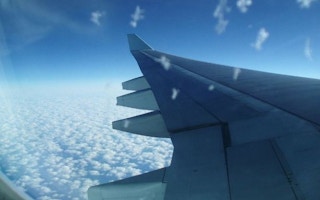The European Union will not bow to pressure to suspend a controversial scheme to charge airlines for their carbon emissions, but is willing to be flexible in finding a solution to a row that threatens to escalate into a full-blown trade war.
The introduction on January 1 of the European Union’s Emissions Trading Scheme (ETS) has drawn howls of protest from airlines around the world, with China banning its carriers from taking part.
“If you think Europe will be forced to suspend, this is not the case. We must have a real global solution,” Europe’s Transport Commissioner Siim Kallas said in an interview on Monday ahead of the Singapore Airshow.
“Europe will implement its system with difficulties, with conflicts, with court cases, whatever, the system will be introduced,” he said.
But Kallas acknowledged the growing opposition, particularly from China, the United States and India.
Plane makers, too, said they were increasingly concerned at the potential fall-out on orders unless tensions are defused.
“I am very worried about the consequences of that. What started out as a solution for the environment has become a source of potential trade conflict and that should be a worry for all of us,” Airbus CEO Tom Enders told an aviation conference in Singapore.
The emissions scheme levies charges for carbon emissions from European and foreign airlines’ flights in and out of Europe. Foreign governments argue the EU is exceeding its legal jurisdiction by calculating the carbon cost over the whole flight, not just Europe.
Most pollution permits will be given for free but airlines will have to pay for a portion of their carbon emissions.
No airline will face a bill until next year, after this year’s carbon emissions have been calculated. Initially airlines will be handed allowances to cover 85 per cent of their emissions. Each allowance represents a tonne of carbon pollution.
Under the scheme, airlines that do not comply may face European fines of 100 euros ($130) for each tonne of carbon dioxide emitted for which they have not surrendered allowances. In the case of persistent offenders, the EU has the right to ban airlines from its airports.
The European Commission says the scheme is needed to tackle growing aviation emissions as part of a global fight against climate change, but the escalating row threatens to hamper efforts to work out an international solution to Europe’s sovereign debt crisis.
Chinese and EU leaders hold a summit in Beijing on Tuesday, with the EU looking to China to dip into its huge foreign exchange reserves to help the euro zone tackle a debt build-up that threatens its economic stability.
Some European airlines are worried, too, that foreign governments could penalize them over the scheme.
Scandinavian air carrier SAS has said there was a risk of reprisals against EU airlines in the form of limitation to traffic rights or new taxes and charges.
The head of the airline industry’s trade group International Air Transport Association (IATA) said on Sunday the impasse between China and the EU was “intolerable,” and called for the United Nations to get involved through its International Civil Aviation Organization (ICAO) to avoid a trade war.
The ICAO has been trying to win agreement among global governments for more than a decade on a way to manage emissions from aviation, currently about 3 per cent of mankind’s greenhouse gas pollution.
An analysis by Thomson Reuters Point Carbon last week shows airlines face a carbon pollution bill of 505 million euros ($670 million) for 2012 under the ETS.
A group of 26 countries opposed to the emissions trading scheme will meet in Moscow on February 21 to discuss a plan of action.
“Trade war must be avoided”
Kallas said a global solution needed ambitious targets and mechanisms to achieve or implement the accepted measures, and that time was running out.
“The conflict has become worse and worse. A trade war must be avoided, so it means a global concept is urgently needed.”
“We need certain commitments from ICAO that there is a will to find a solution. The European Union is ready to be flexible but that doesn’t mean that we simply abandon our system.
“But the flexibility means there will be a global target, global ambition to reduce CO2 emissions. And if this way is clear, then we are ready to negotiate and to accommodate other interests.”
Asked if he had seen signs of flexibility from China and other developing nations that have opposed emissions caps on aviation, Kallas said he was unaware of any shift. But he suggested the crisis could prompt a solution.
“If everybody sees there is a big conflict, that there is a big conflict in the most dynamic mode of transport which can have a very negative impact to all foreign trade, this is a good basis to work hard and find a solution.”










